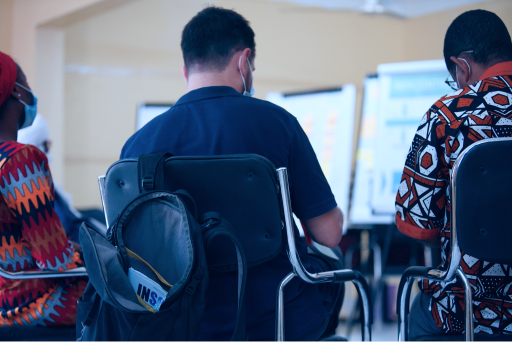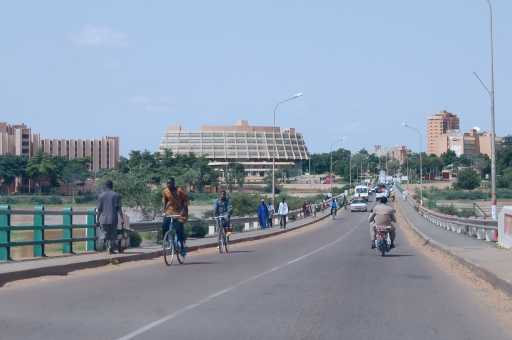And while the entire population faced a concerning new security and socio-political reality, humanitarian organisations were also confronted with the rapid context change. Recent coups in neighbouring countries painted a picture of possibilities. NGOs knew they needed to be ready to respond.
“As security focal point, I was the first to be alerted to the news that I was able to confirm with INSO alerts,” describes the security focal point of an International NGO in Niamey.
“Our situation was all the more critical and worrying because of our proximity to the Presidential Palace, so we wanted to reassure our staff at first then immediately sought the recommendations of the headquarters the activation of the Emergency Plan to secure the staff.”
The INSO team, having already issued an alert to all partners, focused quickly on understanding what the situation could mean for NGOs.
“The first requests from NGO Country Directors were mainly related to the security context in Niamey,” recalls INSO’s Country Director for Niger. “There were also several requests to liaise on expatriate evacuation coordination.”
Within the first 24 hours, the team had issued three security reports with recommendations to avoid movements and areas around specific sensitive locations.
“We also received a lot of calls from partners for emergency advice, or for opinions on the activation of their emergency plan. Their first reflex was to contact INSO, and we were of course ready to help,” adds our Deputy Director in Niger.

Immediately following the coup, INSO hosted a coordination meeting for NGOs.
A focus on the coup was integrated into all presentations, while bilateral discussions and information sharing during the meetings allowed participants to have crucial information for the reframing of their operations on the ground.
The very next day, INSO support convened an emergency roundtable with partners focused on strengthening coordination and reviewing the security context. The team also ensured this session was available online and on-site so that as many participants as possible could join.
INSO also took part in the meetings hosted by the UN, and in close coordination with OCHA (Office for the Coordination of Humanitarian Affairs) was able to coordinate the movements of NGOs. Through close collaboration with other agencies, the INSO team communicated to NGOs about secure access routes and new access constraints, as well as the negative impacts introduced by restrictions to transport and trade.
According to an International NGO Risk Manager, INSO’s contribution was crucial to the humanitarian community during this time:
“Personally, I noticed a greater participation and enthusiasm of NGOs during security meetings. The coup required guidance from experts in this kind of situation. Where other regular meetings were suspended, INSO was practically the only partner that ensured continuity of activities and was ready to share information and bring us together.”
In the days that followed, it became clear that NGOs were not yet directly affected. But despite this, protests and insecurity as well as changes to positions of security and defence forces presented NGO staff with new risks.
“As a local organisation, we encountered security challenges,” shares a staff member of a local NGO. “Some of our colleagues lived in close proximity to the areas of large demonstrations, but we were also concerned about the growing risk of crime.”
“One of our colleagues was the victim of a burglary in this period. We contacted INSO, who was quick to listen to us and provide us with a team to follow up on the incident, and shared information to challenge the community to be more vigilant.”
Along with this incident, this local organisation – and many others – have had to adjust their programming in the aftermath of the coup. Access to some populations has been restricted by the authorities especially in areas with military operations, forcing NGOs to identify new activity locations.
And as the security focal point explains, it has been difficult not only to procure food items for distribution but also to manage expectations of the population in the light of these restrictions.
I noticed a greater participation and enthusiasm of NGOs during security meetings… INSO was practically the only partner that ensured continuity of activities and was ready to share information and bring us together.
“There was a risk of acceptance and collaboration with the beneficiary populations who understandably did not always know why supply and delivery of aid was delayed. The uncertainty as to the duration and conditions of outcome of this situation amplified this, requires further negotiation with the authorities.”
In response to these challenges, many NGOs set up a monitoring unit to keep up to date with the situation. These units draw on INSO’s insights and reports, which the local NGO staff member says are critical.
“The partnership with INSO is very valuable as it has allowed us internally to better manage security and the recommendations allow us to adopt the right behaviours to avoid exposing ourselves to risk.”
Although the diplomatic path seems to be gradually emerging as a way out of the crisis, INSO’s Deputy Director says the political and security context remains uncertain in Niger:
“In terms of humanitarian access, we are already seeing sanctions by ECOWAS [Economic Community of West African States] and border closures putting tension on humanitarian efforts, but it is difficult to guess how the security dynamic will develop. It is possible this new situation could lead to an increase in clashes between Security Forces and armed groups, which would, in turn increase access restrictions on the ground.”
To better respond to current and future humanitarian access priorities, the coming weeks will require increased monitoring on the ground.
In this uncertain context, our support to partners continues through the maintenance of all services with additional monitoring of new access constraints. We are also engaging with new authorities and various actors, including through humanitarian coordination forums, working with our partners to address critical issues and ensure assistance can continue to reach people in need in Niger.
For the sake of confidentiality, certain individuals have been anonymised. INSO’s work in Niger is supported by the USAID’s Bureau of Humanitarian Assistance (BHA), the European Commission, Luxembourg’s Ministry of Foreign Affairs, the United Kingdom’s Foreign, Commonwealth & Development Office, The Swedish International Development Cooperation Agency (Sida) and the Swiss Agency for Development and Cooperation.

